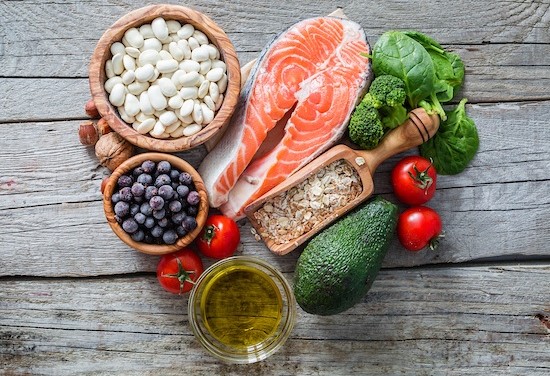Fiber and Fats

Brooke Sawicki, MS, RD, LDN
Outpatient Registered Dietitian
University of Maryland Baltimore Washington Medical Center
In a previous article, we talked about eating a healthy diet to help manage your heart failure. One key point was to eat foods from the main food groups: fruits, vegetables, lean animal or plant-based proteins, whole grains and low-fat dairy.
We also pointed out that it is important to eat high fiber foods throughout the day and to eat healthy unsaturated fats. Those are two recommendations that people don't usually expect to hear. Many people don't know what fiber really is and all the amazing things it can do for their body. Even more surprising may be that not all fats are bad. Do you know what kinds of fiber and fats to eat to maintain a heart healthy diet?
What is Fiber?
Getting the recommended amount of fiber is very good for your health! In addition to a number of benefits, it helps you feel fuller and therefore can help with weight loss or maintenance.
What does fiber do for your body?
There are two different types of fiber in our diet: insoluble and soluble fiber. Insoluble fiber is what most people think of when you are told to "eat more fiber" – it helps your bowels function properly. And it's true – this kind of fiber prevents constipation and helps move food throughout your digestive system faster. Soluble fiber, on the other hand, forms a gel-like substance in our body and helps your body manage glucose levels, lower blood cholesterol levels, aids with weight management, and feeds our healthy gut bacteria. These benefits are very important for people with heart failure.
What are the best sources of fiber?
The best sources of fiber in the diet are whole grains, fruits, vegetables, legumes, nuts, and seeds. In general, we recommend that men eat 38 grams of fiber per day and women eat 25 grams of fiber per day.
What is Fat?
Contrary to popular belief, not all fats are bad. True, some are very bad and can lead to heart disease and make it worse. But there are "good" fats that we encourage our patients to include in their diets.
In general, fats from your diet are essential to providing your body with energy, protecting our organs, helping our body produce hormones, and helping keep our body insulated. Fats also play a key role in helping your body absorb the fat-soluble vitamins: vitamin A, D, E, and K.
There are four main types of dietary fats: saturated, Trans, monounsaturated, and polyunsaturated fats. Each of these can be classified as either a "bad" or "good" fat source.
"Bad" Fats
The "bad" fats are saturated and Trans fats. These are solid at room temperature. Sources of saturated fats mostly come from animal products, such as fatty cuts of meat, poultry with the skin, butter, and full-fat dairy products. Saturated fats can also be found in tropical plant oils like coconut or palm oil. We recommended that our patients limit their intake of saturated fats because they can raise LDL or "bad" cholesterol levels and could make heart disease worse.
Trans fats come from partially hydrogenated vegetable oils, such as stick margarine, shortening, fried foods, and baked goods. Trans fats are dangerous to your health and you should try to avoid them as much as possible. Trans fats can raise your "bad" cholesterol, lower your HDL or "good" cholesterol, create inflammation, and can make your heart disease worse.
"Good" Fats
The "good" fats are monounsaturated and polyunsaturated fats, which are liquid at room temperature. Monounsaturated fats come from sources such as olive oil, canola oil, avocados, peanuts, nuts, and seeds. Monounsaturated fats help lower bad cholesterol in your blood and may help with your heart disease. They also provide your body with vitamin E, which is an antioxidant.
Similar to monounsaturated fats, polyunsaturated fats help lower bad cholesterol, may help with your heart disease, and provide vitamin E. Polyunsaturated fats also provide omega-6 and omega-3 fats, which your body cannot produce on its own and must get from what you eat. Polyunsaturated fats can be found in sources like soybeans and soybean oil, sunflower oil, walnuts, sunflower seeds, and flaxseeds. Additionally, fatty fish, like salmon, are high in omega-3 fatty acids.
To incorporate more healthy fats into your diet, try cooking with olive oil, making your own oil-based salad dressings, adding avocados to salads, incorporating nuts or seeds into meals and snacks, and incorporating salmon as a protein source 2-3 times per week.
For More Information
For more information and heart healthy recipes, check out The American Heart Association Website.
If you have specific questions about your dietary intake or would like more information on a dietary plan that is right for you, make sure you meet with a Registered Dietitian. They are the experts in the field! To reach UM BWMC's Digestive Health Center, please call 410-553- 8146.
